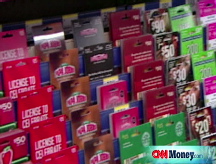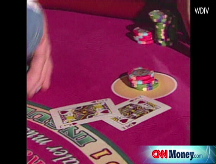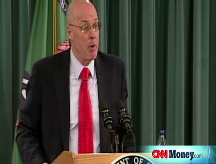Dismal end to stocks' week
Volatile markets finish lower, with Dow down 338, as investors abandon recovery attempt.
NEW YORK (CNNMoney.com) -- Stocks slumped Friday, with investors abandoning a recovery attempt, as the worst retail sales on record ignited fears of a long recession.
The Dow Jones industrial average (INDU) fell 338 points, or 3.8%. Earlier, the blue-chip indicator had lost as much as 363 points and gained as much as 88 points.
The Standard & Poor's 500 (SPX) index skidded 4.1% and the Nasdaq composite (COMP) shed 5%.
All three major gauges slid on the week as well, with the Dow losing 5%, the S&P down 6.2% and the Nasdaq down 7.9%.
Stocks crumbled through the early afternoon as investors considered the bleak outlook for consumer spending amid the weak retail sales report. Selling pressure eased up in the middle of the afternoon and then returned near the close.
"The recession has been mild up to this point, but I think we're in for a much uglier one in the fourth quarter," said Scott Anderson, senior economist at Wells Fargo. "The retail sales report demonstrates that."
U.S. sales in October posted the worst monthly decline since the Commerce Department initiated the current measurement standard in 1992.
The corporate news Friday was just as bad. Freddie Mac posted a big quarterly loss. Sun Microsystems announced massive job cuts and Citigroup is reportedly getting ready to announce layoffs.
"Fundamentally the economy is very weak," said Robert Brusca, chief economist at FAO Economics. "The Freddie Mac losses are a reminder of that."
Stocks rallied Thursday, with the Dow gaining 552 points, its third-best single-session point gain ever, as the market bounced back from levels not seen since 2003. Some analysts said that the recovery was significant in helping to establish a bear market bottom.
However, after such a rally, stocks were vulnerable to a pullback Friday, particularly after the retail sales report.
Market breadth was negative. On the New York Stock Exchange, losers beat winners by almost four to one on volume of 1.45 billion shares. On the Nasdaq, decliners topped advancers by more than three to one on volume of 2.31 billion shares.
After the close, Fidelity said it was cutting an additional 1,700 jobs in the first quarter of 2009 as part of an ongoing cost-cutting effort. A week ago the company said it was cutting 1,300 jobs
Retail sales: Retail sales fell 2.8% in October versus a revised 1.3% drop in September. Sales excluding volatile autos fell 2.2% in October, versus a revised 0.5% drop in September. Both results were worse than expected, according to a survey of economists by Briefing.com. (Full story)
"Sales were pretty awful across the board," Anderson said, noting that sales plunged pretty much everywhere other than at grocery stores and on health care. "With consumers only spending on the essentials, that's pretty dire."
Also on Friday, retailers J.C. Penney (JCP, Fortune 500) and Abercrombie & Fitch (ANF) both reported lower quarterly earnings and issued bleak forecasts for the critical fourth quarter.
A separate report showed a slight improvement in consumer sentiment, according to the latest survey from the University of Michigan. Sentiment rose to 57.9 in November from 57.6 in late October, versus forecasts for a decline to 57.
Investors were also gearing up for the Group of 20 meeting in Washington, which gathers leaders from around the world to address the global financial crisis. It kicks off with a White House dinner Friday. (Full story)
The European economy is officially in a recession, EU leaders said Friday. Germany has already said it is in a recession. Hong Kong is in a recession. And many economists think the U.S. is in a recession, despite a lack of official declaration.
Recession is generally defined as two consecutive quarters of shrinking economic growth. In the U.S. a recession is officially declared by the National Bureau of Economic Research.
Speaking early Friday, Federal Reserve Chairman Ben Bernanke said that financial markets remain under severe strain. He pledged to continue working with central banks around the world and seemed to indicate the U.S. federal reserve could cut interest rates again at the December meeting. (full story)
Company news: Troubled mortgage giant Freddie Mac (FRE, Fortune 500) reported a steep $25 billion quarterly loss and said it will start chipping away at the $100 billion in taxpayer funds set aside for its bailout. (Full story)
Sun Microsystems (JAVA, Fortune 500) said Friday it will cut up to 6,000 jobs, or 18% of its workforce, as a cost-cutting measure. The software and computer networking company also said it was restructuring its software business operations.
Citigroup (C, Fortune 500) is reportedly getting ready to lay off another 10,000 people on top of the 23,000 it has already let go, according to a Wall Street Journal story Friday. The company is also expected to boost credit card rates, the report said.
Nokia (NOK) said fourth-quarter sales for the broad mobile handset industry will decline. The phone maker said worse credit conditions and the weak economy were to blame.
Hartford Financial Group (HIG, Fortune 500), the troubled insurer, said it has purchased a small bank, making it eligible to receive up to $3.4 billion in funds from the government's bailout plan.
Investors again pulled money out of equity mutual funds last week, following the first week in months in which investors added money to funds.
In the week ended Nov. 12, investors pulled roughly $31.8 billion out of equity mutual funds, according to tracking firm Trim Tabs. In the previous week, investors added roughly $2.2 billion to funds. However, that one week was an anomaly, with investors cashing out of funds in 15 of the last 16 weeks amid the stock market selloff.
Other markets: Asian and European markets rallied in response to the U.S. advance Thursday.
The dollar gained against the euro, but fell versus the yen.
COMEX gold for December delivery rallied $42.50 to settle at $742.50 an ounce.
U.S. light crude oil for December delivery fell $1.20 to settle at $57.04 a barrel on the New York Mercantile Exchange.
Gasoline prices dipped another 2.6 cents to a national average of $2.152 a gallon, according to a survey of credit-card activity released Friday by motorist group AAA. The decline marks the 58th consecutive day that prices have decreased. During that time, prices dropped by $1.70 a gallon, or 44.2%.
Lending rates: The cost of borrowing rose modestly Friday, but remained near recently improved levels.
The 3-month Libor rose to 2.24% from 2.15% Thursday, according to Bloomberg.com. Overnight Libor rose to 0.56% from 0.4% Thursday, and up modestly from an all-time low of 0.32% last week. Libor is a key interbank lending rate.
The yield on the 3-month Treasury bill, seen as the safest place to put money in the short term, fell to 0.11% from 0.19% Thursday, with investors preferring to take a small return on their money than risk the stock market. In September, the 3-month yield reached a 68-year low around 0% as investor panic peaked.
Treasury prices rallied, lowering the yield on the benchmark 10-year note to 3.72% from 3.86% Thursday. Treasury prices and yields move in opposite directions. ![]()





